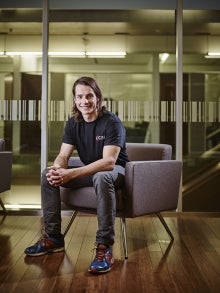Jean-Philippe MacLean is in Germany discussing quantum science at the prestigious 66th Lindau Nobel Laureate Meeting.

What is the purpose of the Lindau Nobel Laureate Meeting?
The meeting brings together young scientists and Nobel Laureates to foster discussion. About 400 researchers have successfully applied with 29 Laureates confirmed to attend. The aim is for participants to stay connected afterward and become ambassadors for scientific dialogue.
Why did you apply?
After being awarded the Vanier Canada Graduate Scholarship last year, NSERC (Natural Sciences and Engineering Research Council of Canada) nominated me to go. I knew I couldn’t pass up the opportunity to engage with scientists who are very well established and recognized by the community.
What does the opportunity to meet Nobel Laureates mean to you?
These are scientists who have made significant contributions to the scientific community and have been recognized for it. This is an opportunity not only to listen to them, but also to talk to them about what they’re doing. Some of the big names I’m excited to see are Serge Haroche, Roy Glauber, and Theodore Hansch. There’s also going to be the Canadian that just won the Nobel Prize as well, Arthur McDonald. As a graduate student, I’ve been developing an appreciation for what it’s like to research physics, and these are people who have done it and been successful. It’s inspiring, it’s exciting.
How would you describe your research to someone you might meet at the Meeting?
I work in experimental quantum optics in the Quantum Optics and Quantum Information group led by Kevin Resch. Kevin’s lab has expertise in producing single photons, working with entanglement and using entanglement as a resource for all sorts of different experiments. We were recently able to store and manipulate single photons in a diamond quantum memory, for example.
That is the applied side, but Resch’s group is also interested in the more fundamental side as well. We are collaborating with a group led by Robert Spekkens at the Perimeter Institute for Theoretical Physics to investigate causality in quantum mechanics. Are there causal structures that are possible in quantum mechanics that aren’t possible in classical mechanics? It turns out that, yes, there are fundamental differences and the types of causal structures that are possible are much richer.
What is your favourite part of doing research?
I really like being in the lab–it’s like playing with big LEGOs, but the LEGOs are way more expensive, and way cooler. There are days things aren’t working and you just want to leave, but then there are days when you spend the whole day doing a calculation trying to figure something out, you go to the lab and it actually works right under your nose. Those are the best days.
Are there any applications to the science you’re doing now that you’re really excited about?
We’re trying to store and manipulate photons, gradually working toward some sort of global quantum communication network. Basically, what we’re trying to do is build the critical components for a quantum computer and its communications interface. It’s nice because you have more short-term applications, and then you also have these very long-term applications which may never work out but, if they do, would be pretty amazing.
What do you hope to achieve with your scientific outreach?
I realized in high school that I really enjoyed physics, and I was lucky to encounter excellent teachers along the way and also have a father who was a scientist because they were able to show me the bigger picture. So that’s what I would love to do for youth. You go in there, show them something small that they can bang their head against, but you try and put it in a larger perspective. If you can get them to understand just a little bit why they should care about this, then that’s wonderful.